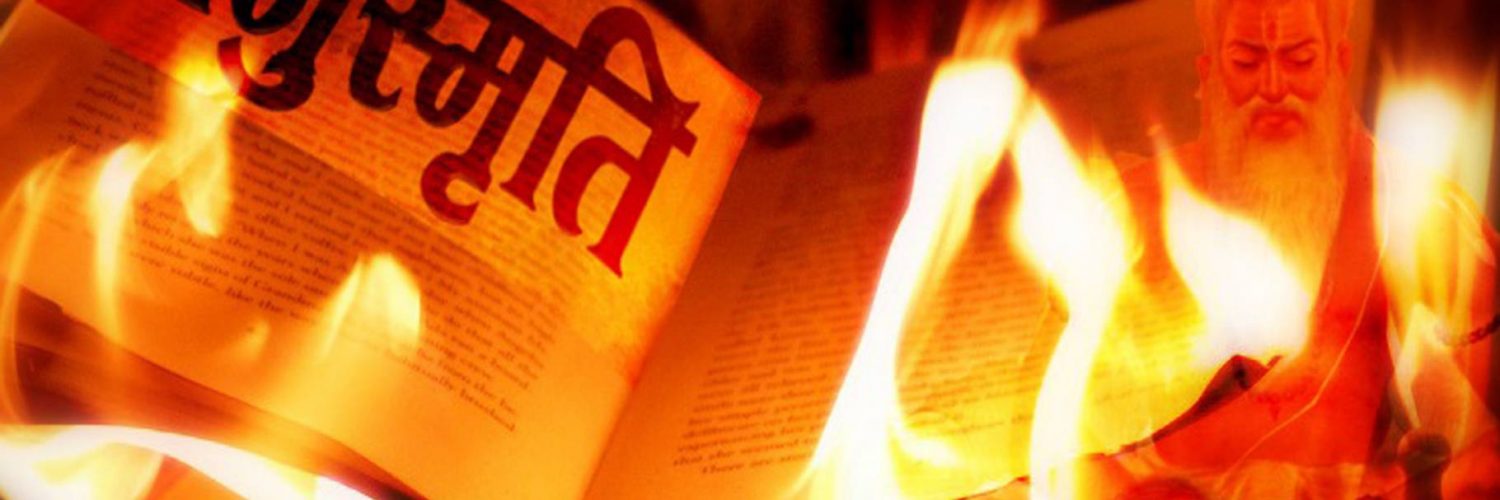From past few days, there is so much discussion going on in social media platforms over burning text of Manusmriti, so called sacrosanct text, revered for its sole objective of safeguarding “Hindu dharma”. Some of our friends and comrades, decided to collectively burn Manusmriti text to express their protest against the very inhuman value system, which Manusmriti advocated for centuries. Some of us believe, rightfully so, this is the text which laid foundation for unjust social order and which need to be resisted in its entirety. When it was decided to protest by burning the text of Manusmriti, it is obvious that the fight is between people who believe in change and aspire for a just and humane social order on one side and people who wants to follow Manusmriti and who believes in Varnashrama dharma on the other side. Although, the later would not admit their desire to go back for feudal value system so openly, at least in social media platforms, while enjoying the comfort thrown at them by modern day capitalism. However, they resort to vulgar abuse against the critiques in defence of an age old, fungus infected system propagated by this text without actually mentioning their discomfort about burning this text. Here, it is crucial to acknowledge, whether consciously or unconsciously the so-called value system propagated by this text has deeply imbibed into to our current day lives and life choices. Even the people who oppose it in principle, including many of us, needs to undergo a complete unlearning process to get rid of those deeply imbibed values as part of culture and tradition and as part of social conditioning.
The struggle is inevitable between opponents of this unholy text and the supporters of it. It is nothing but a struggle between an aspiration for a just, equal, caste, class and gender sensitive, humane and democratic society on one side and refusal to give up the privilege that this unholy text facilitated for certain sections of the society and their desire to continue the feudal, patriarchal exploitative value system purely for their caste and class interest, on the other side. This small write up is not meant for either of these two groups. This is also not to dwell into which part of the text is more harmful. This is with a strong conviction that we need to reject and destroy the Manusmriti for the oppressive ideology it propagated for centuries.
I am writing this for friends who still have certain confusion in their minds on whether a symbolic gesture of burning Manusmriti amounts to resistance. Is it is part of the real struggle? I would to say, yes it is part of the bigger struggle, where we all need to further collaborate and grow in multi-fold to offer much bigger and constructive fight. I would like to reiterate resistance is the only way and it need to be offered through every possible platform and in as many forms as it can be offered and not leave a single opportunity. Even at times, the resistance appears as symbolic at the outset; it is still the only way. There is no one form of resistance and there is no one form of expressing dissent. It is prerogative for the oppressed to decide what is the mode of protest, and what is the form of resistance and it is clearly not me and you who decides what is the appropriate form of protest, and what is the “civilized” form of expressing one’s own dissent. As Arundhati Rai once clearly said, who are we to say the Adivasi (read as indigenous) have to undergo hunger strike to protest the corporates trying to grab the land under their feet while they are actually facing starvation deaths? These words echo in my ears in this very specific context. Resistance is the only way and in this very context only by resisting this text, we remain as humans, as women, as men and as meaningful breathing souls.
While the discussions are going on over burning this text, some of our friends called for a critical engagement with this text and the ideology it propagated in order to go beyond symbolic gestures and contribute to the struggle by writing and reading. While I acknowledge the value of critical learning, I still have certain reservations on this point of view. Fully being aware of the current critical scenario of my great country, I find this as a confused expression. There are several aspects to this proposal. One, critical learning is not possible as long as we refuse to come out of our comfort zones and challenge the structures which facilitate systematic oppression. The systemic oppression is endorsed by the value system preached by this unholy text. We should not forget, it is with some privilege that we advocate for such writing and reading and it is not an option for many who are already fighting fascism and communalism relentlessly on ground. Two, writing and reading are forms of critical learning, but not the “only” forms of critical learning. Three, at the outset, it may look like a symbolic protest for people standing physically far from geo-center of these happenings. How can we forget the merciless attacks on students who called for beef festivals? Student who were brutally beaten up for organizing a study circle in reputed educated institution of higher learning supposedly the institutions meant to facilitate thousand thoughts to flourish. At this moment, anyone can be killed on broad day light for mere suspicion of killing a cow, or mere action of a dalit boy sitting on a horse, a Muslim man carrying cattle in van as part of regular business, or a Muslim family keeping a piece of meat in their refrigerator. A doctor can be booked under draconian law and confined in prison for supplying oxygen cylinders for a paediatric ward when state and system failed to deliver their duties. The perpetrators of these crimes learnt their values from this sacred text. In such, brutal and charged up situation, how one perceive burning Manusmriti as only a symbolic action? After all, this is the text, which is genesis for the arrogance and oppressive mentality, which paved way for those heinous crimes. Burning Manusmriti, no more a symbolic gesture, but the obvious form of struggle and resistance. Moreover, a collective action such as burning Manusmriti at this point empowers people against whom the very text is used to control and discipline as per the whims and fancies of the ruling.
Nope, it is not easy and it is not even symbolic any more. It is struggle and it is beyond social media vulgar abuses. The aspiration to overthrow this unholy text and the oppressive ideology it propagated is facing physical violence in the streets, very often. I believe many of us actually fighting Manusmiriti on our daily lives in one way or the other in our respective field of work. Fighting against discrimination and standing firm for politics of equality, fighting for workers’ rights, efforts to promote democratic academic atmosphere, fighting against sexual harassment and struggling for gender justice, all are our struggles. The genesis of all these challenges is an inhuman system, which is built on the foundation of oppressive ideology propagated by this text. Unless we challenge these structures and destroy them, we cannot build more humane, egalitarian and democratic structures. Burning of this text is a an act of keeping our collective conscious intact against such structures.
My humble request is not to dismiss these protest forms as symbolic while the current regime is highly sensitive about even such symbolic gestures. Moreover, as our old beard man said the philosophers have only interpreted the world, in various ways. The point however, is to change it. Likewise, manusmriti, in its literary form was much analysed critically. Now it is time to challenge it in the streets. Yes, in the same streets where dalit women in Khirlanji were made parade naked and brutally killed. Dalit men in Una tied to a car on the name of cattle thieves and brutally assaulted. In the same streets where Pehlu Khan was killed, in the very streets where some rallied to protect the perpetrators of sexual violence and murder of an eight year old Asifa Bano. Now it is time to challenge Manusmriti in the very streets. Hence, in my view, burning of manusmriti is nothing but accepting such challenge and preparing to be part of a bigger struggle.
*









మను స్మృతి కాదు,
హ్యూమన్ స్మృతి కావాలి.